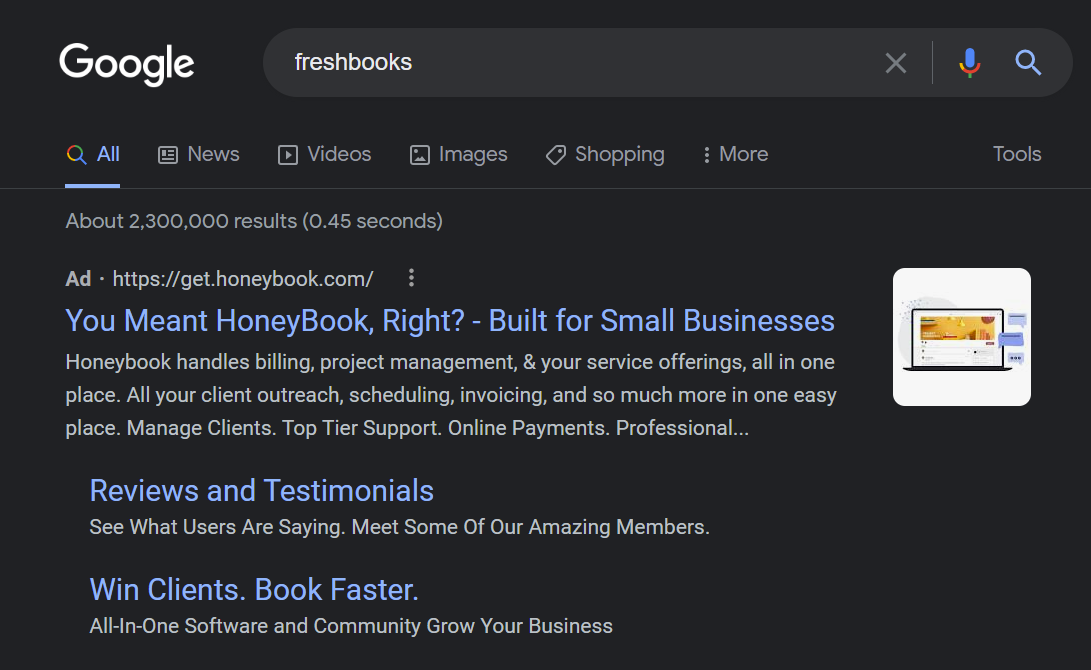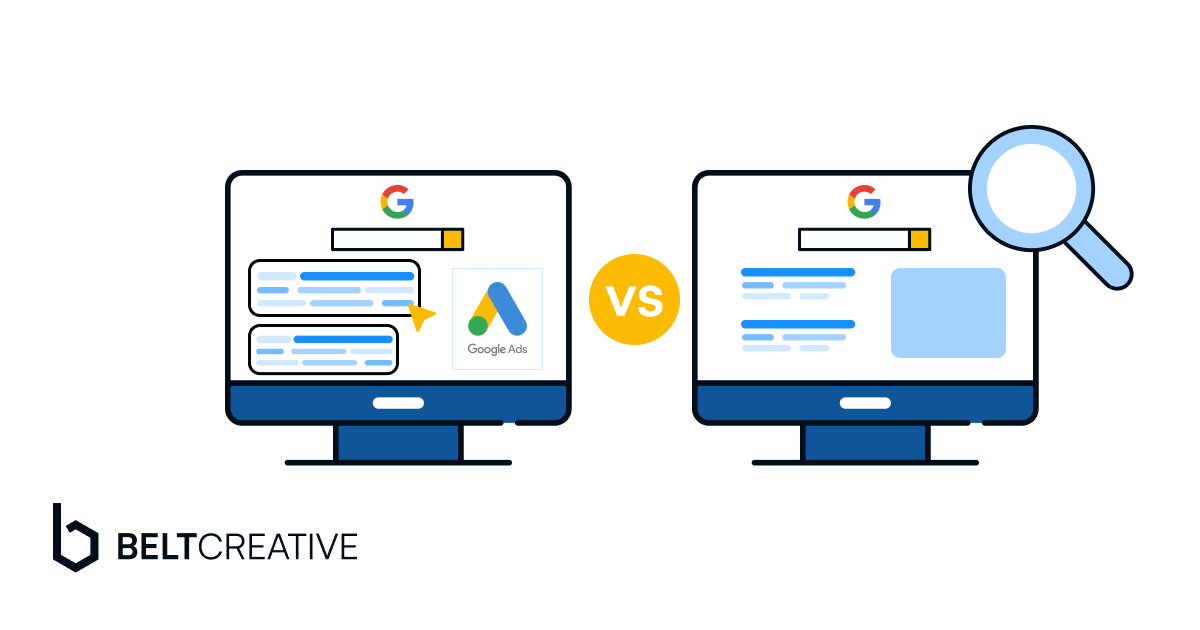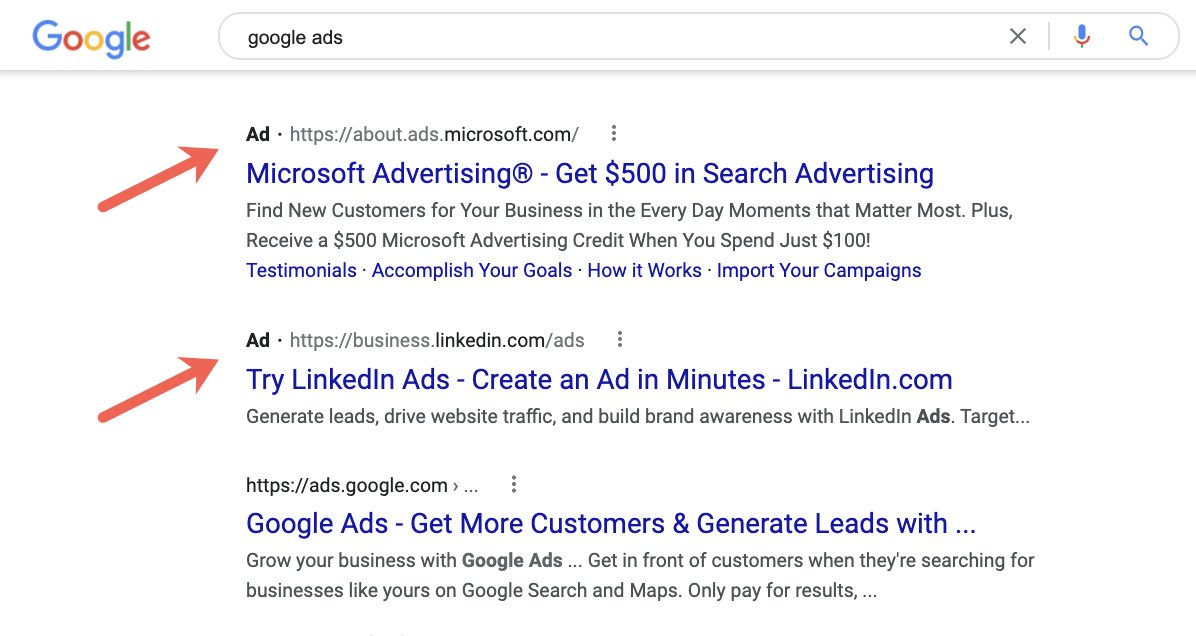As a business owner, you may be wondering whether to invest in Google search ads or focus on generating organic traffic.
Both options have their advantages and disadvantages, and choosing the right strategy can significantly impact your business's success.
In this article, I will explore the differences between Google search ads and organic traffic, and help you determine which one is the best fit for your business.

Understanding Google Search Ads
Google search ads, also known as pay-per-click (PPC) ads, are advertisements that appear at the top and bottom of Google search engine results pages (SERPs).
These ads are marked with a small "Ad" label and are designed to attract users' attention and drive traffic to your website.
With search ads, you bid on specific keywords relevant to your business, and your ad is displayed when users search for those keywords.
The Benefits of Google Search Ads
1. Immediate Visibility: Google search ads provide instant visibility for your business.
As soon as you set up your campaign, your ads can start appearing in front of potential customers who are actively searching for products or services similar to yours.
2. Targeted Reach: With search ads, you have control over who sees your ads.
You can target specific keywords, locations, demographics, and even the time of day your ads are displayed.
This level of targeting ensures that your ads are shown to the most relevant audience, increasing the chances of conversion.
3. Measurable Results: Google search ads come with robust tracking and analytics tools that allow you to measure the performance of your campaigns.
You can track clicks, impressions, conversions, and other key metrics to understand the effectiveness of your ads and make data-driven decisions to optimize your campaigns.
4. Flexibility and Control: Search ads offer flexibility in terms of budget and ad spend.
You can set a daily or monthly budget that suits your business needs, and you only pay when someone clicks on your ad.
Additionally, you have full control over your ad copy, landing pages, and targeting options, allowing you to tailor your campaigns to your specific goals.
5. Competitive Advantage: By investing in search ads, you can gain a competitive advantage over businesses that rely solely on organic traffic.
Your ads can appear above organic search results, increasing your visibility and driving more traffic to your website.

The Drawbacks of Google Search Ads
1. Cost: While search ads can be highly effective, they come at a cost.
Depending on the competitiveness of your industry and the keywords you target, the cost per click (CPC) can vary significantly.
It's essential to carefully manage your budget and monitor your ROI to ensure that your ad spend is generating a positive return.
2. Ad Fatigue: Over time, users may become accustomed to seeing search ads and develop ad blindness.
This means that they may start ignoring or scrolling past ads, reducing their effectiveness.
To combat ad fatigue, it's crucial to regularly update your ad copy, test different variations, and stay relevant to your target audience.
3. Limited Real Estate: Google search ads have limited space for text and visuals.
Crafting compelling ad copy within these limitations can be challenging, and it's important to make every word count.
Additionally, your ad may be competing with other businesses for the same keywords, making it even more crucial to stand out from the crowd.
4. Dependency on Google: Investing solely in search ads means relying on Google as your primary source of traffic.
While Google is the most popular search engine, changes in algorithms or policies can impact your ad performance.
Diversifying your traffic sources can help mitigate this risk.
5. Learning Curve: Setting up and managing effective search ad campaigns requires knowledge and expertise.
If you're new to PPC advertising, there may be a learning curve involved in understanding how to optimize your campaigns for maximum results.
Consider investing in professional help or dedicating time to learn the ins and outs of search ads.

Understanding Organic Traffic
Organic traffic refers to the visitors who find your website through unpaid search engine results.
When users search for specific keywords or phrases, search engines like Google display a list of relevant websites.
The order in which these websites appear is determined by complex algorithms that consider various factors such as relevance, authority, and user experience.
The Benefits of Organic Traffic
1. Cost-Effective: Unlike search ads, organic traffic is free.
You don't have to pay for each click or impression, making it a cost-effective way to drive traffic to your website.
However, it's important to note that generating organic traffic requires time and effort in optimizing your website for search engines.
2. Long-Term Results: While search ads provide immediate visibility, organic traffic can deliver long-term results.
By consistently optimizing your website for search engines and creating high-quality content, you can improve your website's ranking over time and attract a steady stream of organic traffic.
3. Credibility and Trust: Many users trust organic search results more than paid ads.
Ranking highly in organic search results signals to users that your website is authoritative and trustworthy, increasing the likelihood of them clicking through to your site.
4. Higher Click-Through Rates: Studies have shown that organic search results receive higher click-through rates compared to paid ads.
Users often skip over ads and gravitate towards organic listings, especially if they perceive them as more relevant to their search query.
5. Brand Building: Generating organic traffic allows you to build your brand's online presence and reputation.
By consistently appearing in search results for relevant keywords, you can establish your business as an industry authority and gain recognition among your target audience.
The Drawbacks of Organic Traffic
1. Time-Intensive: Building organic traffic takes time and effort.
It requires optimizing your website for search engines, creating high-quality content, and building backlinks.
If you're looking for immediate results, organic traffic may not be the best strategy for your business.
2. Uncertain Results: While you can optimize your website for search engines, there's no guarantee that you'll achieve top rankings.
Search engine algorithms are complex and constantly evolving, making it challenging to predict and control your website's organic visibility.
3. Limited Control: Unlike search ads, where you have full control over your ad copy and targeting options, organic traffic is subject to search engine algorithms.
Changes in algorithms or policies can impact your website's ranking, and you may need to adapt your strategies accordingly.
4. Competition: Ranking highly in organic search results can be competitive, especially in saturated industries.
Competing with established websites and businesses for top positions requires a comprehensive SEO strategy and ongoing optimization efforts.
5. Difficulty in Measuring ROI: Unlike search ads, measuring the return on investment (ROI) of organic traffic can be challenging.
While you can track metrics such as organic traffic volume and keyword rankings, attributing specific conversions or sales solely to organic traffic can be difficult.

Which One Is Right for Your Business?
Now that we've explored the benefits and drawbacks of both Google search ads and organic traffic, let's discuss how to determine which strategy is right for your business.

Consider Your Goals
Start by considering your business goals.
Are you looking for immediate visibility and quick results?
Or are you focused on long-term brand building and credibility?
If you need immediate results, search ads may be the better option.
However, if you're willing to invest time and effort into building a sustainable online presence, organic traffic can deliver long-term benefits.
Analyze Your Budget
Next, analyze your budget and resources.
Search ads require a financial investment, as you'll need to allocate a budget for ad spend.
Consider whether your business can afford ongoing ad spend and whether the potential return justifies the cost.
On the other hand, organic traffic requires time and effort but doesn't have direct financial costs.
Assess your available resources and determine if you have the capacity to invest in SEO and content creation.
Assess Your Industry and Competition
Take a close look at your industry and competition.
Are there already established businesses dominating the search results?
If so, ranking highly in organic search results may be challenging.
In such cases, search ads can provide a competitive advantage by allowing you to appear above organic listings.
Conversely, if your industry has less competition or you have a unique value proposition, focusing on organic traffic may yield better results.

Understand Your Target Audience
Understanding your target audience is crucial in determining the right strategy.
Consider their search behavior and preferences.
Do they tend to click on ads or gravitate towards organic listings?
Conduct market research and analyze user behavior to gain insights into how your target audience interacts with search results.
This information can help you make an informed decision about whether to invest in search ads or focus on organic traffic.
Consider a Combination Approach
Lastly, consider adopting a combination approach.
Instead of choosing between search ads and organic traffic, you can leverage the benefits of both strategies.
By running search ads while simultaneously investing in SEO and content marketing, you can maximize your visibility and reach a broader audience.
This approach allows you to capture immediate leads through search ads while building a sustainable source of organic traffic for long-term growth.

Conclusion
When it comes to choosing between Google search ads and organic traffic, there is no one-size-fits-all answer.
The right strategy depends on your business goals, budget, industry, competition, and target audience.
Carefully evaluate the benefits and drawbacks of each option and consider a combination approach if it aligns with your resources and objectives.
Remember, continuous monitoring, optimization, and adaptation are key to success, regardless of the strategy you choose.